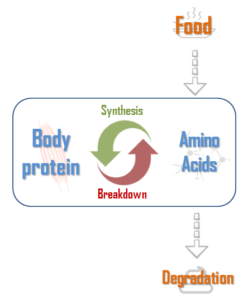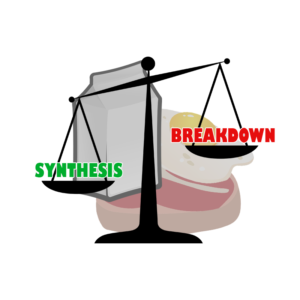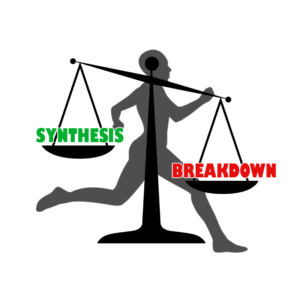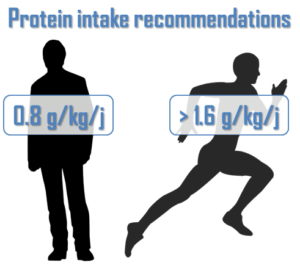Why do endurance Athletes needs more protein?
14 May 2019
Nowadays, athletes who practice resistance-type exercises (i.e. a short and intense sport such as fitness or powerlifting) have particular protein needs: these can be as high as two to three times the recommendation.
But endurance athletes (i.e. a moderate intensity sport over a relatively long period such as running, cycling, or natation) have also specific nutritional needs, particularly high-level athletes who sorely test their muscles!
During a long effort, proteins help to provide the energy needed by muscles. During recovery, they allow muscle to rebuild themselves and be ready for the next workout!
To understand it better, let’s consider an average person (non athlete). His body renews a part of its proteins everyday. A fraction is broken down, so there is an amino acids release which are then used to synthetize new proteins. This is the protein turnover (figure 1). However all amino acids from protein breakdown cannot be used for synthesis. A part of them are degraded then eliminated. Consequently, it is necessary to provide proteins to the body trough the diet to counterbalance these losses1. The protein needs of this person are about 0.8 g/kg of bodyweight per day2.

In this situation, there is a balance between proteins breakdown and synthesis, thus lean mass is maintained.
Protein synthesis is drastically reduced during a physical exercise in order to give the body’s energy resources to physical effort. During the first hours of exercise, the main energy source is glucose. When these carbohydrates tend to run out (after 2 hours), energy is provided by fat reserves. Proteins are used simultaneously, and they provide 2 to 8% of total energy: protein breakdown is increased3 4 5.
To draw up a summary: protein synthesis is reduced while breakdown is boosted. The protein balance is then negative.
Consuming proteins before training allows the body to have available free amino acids directly to satisfy its energy needs.
This thus makes it possible to limit the mobilization of muscle proteins. The quantity to consume depends on the exercise duration: the longer the training is, the more amino acids are oxidized to provide energy, so more proteins will be needed to compensate. It depends also on the last meal composition before the training: the more it is carbohydrate-rich, the more the glycogen reserved will be sufficient, therefore the less there will be necessary to mobilize alternative energy resources.5 6


After exercise, muscles are damaged. The body will regenerate them and rebuild in order to be well prepared for the next training: protein synthesis is increased (it is multiplied by 2 to 5 depending on the volume and the intensity of the exercise) during 24 to 72h6 7.
Simultaneously, protein breakdown remains high so much that if the person doesn’t increase his protein intake the global protein balance will remain negative8.
Consequently, it is recommended for athletes to consume proteins after training (a dose of approximately 20g). On one hand it will increase the blood concentration of essential amino acids, which are amino acids that body cannot synthetize. They must be supply by the diet. These ones have a robust anabolic effect: the muscle protein synthesis will be multiplied by 2 to 3 9. On the other hand it will increase the insulin blood concentration (even if there is no carbohydrate!) and this will strongly reduce the protein breakdown.6 9
Globally, these proteins taken just after training will stimulate the synthesis and reduce muscle protein breakdown: the overall protein balance is positive! This profile is favorable for muscle building, and thus performances improvement.
Finally, an intense and prolonged physical exercise is associated with numerous hormonal and biochemical changes within the body. This can have a negative impact on the immune system. In the case of proteins under-consumption, the restoration of the immune system will be limited. The person is therefore more inclined to contract an infection10.
To conclude, it is essential to consume more proteins, about twice the recommendation (which are only appropriate for an average person but not for a high-level athlete). It represents more than 1.6g/kg of bodyweight per day. This allows the body to maintain its integrity but also ensure the development of muscle mass and therefore performance improvement.4 10 11

So products for endurance athletes need to contain enough quality proteins. The chemical index is used to evaluate the nutritional quality of a protein. It is based on the essential amino acids amount. The reference is the FAO protein12, ideal since it contains all essential amino acids in minimal proportions necessary for body: its chemical index is set at 100.
However there are proteins with a chemical index higher than 100! For instance milk proteins, such as micellar caseins which have a chemical index of 128 13. These proteins are rich in essential amino acids.
These ones have a positive impact on muscle protein synthesis.
These milk proteins will be the subject of the next blog article!
For more information, please contact us
Authors: Rémi MALETERRE and Audrey BOULIER.
*Ironman triathlon: 2.4 miles (3.9km) of natation, 112 miles (180km) of cycling, 26.2 miles (42.2km) of running. For an athlete, it represents 7,000 to 10,000 kcal of energy consumption14.
_______________________________________________________
1. Poortmans, J.R., Carpentier, A., Pereira-Lancha, L.O., & Lancha Jr., A. (2012). Protein turnover, amino acid requirements and recommendations for athletes and active populations. Brazilian Journal of Medical and Biological Research, 45(10), 875-890. Epub June 06, 2012.https://dx.doi.org/10.1590/S0100-879X2012007500096
2. Agence nationale de sécurité sanitaire de l’alimentation, de l’environnement et du travail (ANSES). (2019) Les protéines : définition, rôle dans l’organisme, sources alimentaires. Repéré à https://www.anses.fr/fr/content/les-prot%C3%A9ines
3. Moore D.R., Camera D.M., Areta J.L., Hawley J.A. (2014). Beyond muscle hypertrophy: why dietary protein is important for endurance athletes. Applied Physiology, Nutrition, and Metabolism, 39:987-997. Epub February 07, 2014. https://doi.org/10.1139/apnm-2013-0591
4. Tarnopolsky M., Gibala M., Jeukendrup A., Phillips S. (2007). Nutritional needs of elite endurance athletes. Part II: Dietary protein and the role of caffeine and creatine. Euro J Sport Sci, 2005;5(2):59-72. Epub February 20, 2007. https://doi.org/10.1080/17461390500137485
5. Rose A.J., Richter E.A. (2009). Regulatory mechanisms of skeletal muscle protein turnover during exercise. J Appl Physiol, 106:1702–11. Epub May 01, 2009. https://doi.org/10.1152/japplphysiol.91375.2008
6. Kumar V., Atherton P., Smith K., Rennie M.J. (2009). Human muscle protein synthesis and breakdown during and after exercise. J Appl Physiol 106, 2026–2039. Epub June 01, 2009. https://doi.org/10.1152/japplphysiol.91481.2008
7. Wilkinson S.B., Phillips S.M., Atherton P.J., Patel R., Yarasheski K.E., Tarnolpolsky M.A., Rennie M.J. (2008). Differential effects of resistance and endurance exercise in the fed state on signalling molecule phosphorylation and protein synthesis in human muscle. J Physiol 586: 3701–3717. Epub July 31, 2008. https://doi.org/10.1113/jphysiol.2008.153916
8. Phillips S.M., Tipton K.D., Aarsland A.A., Cortiella J.C., Wolf S.P., Wolfe R.R. (1997). Mixed muscle protein synthesis and breakdown after resistance exercise in humans. Am. J. Physiol. 273 (Endocrinol. Metab. 36): E99–E107. Epub July 01, 1997. https://doi.org/10.1152/ajpendo.1997.273.1.E99
9. Atherton P.J., Smith K. (2012). Muscle protein synthesis in response to nutrition and exercise. J Physiol, 590(5):1049–1057. Epub January 31, 2012. https://doi.org/10.1113/jphysiol.2011.225003
10. Gleeson M., Bishop N.C. (2000). Elite athlete immunology: importance of nutrition. Int J Sports Med, 21(Suppl 1):S44-50. 2000. https://www.thieme-connect.com/products/ejournals/html/10.1055/s-2000-1451#N68858
11. Phillips S.M., Van Loon L.J. (2011). Dietary protein for athletes: from requirements to optimum adaptation. J Sports Sci 29 (Suppl. 1), S29–38. Epub December 09, 2011. https://doi.org/10.1080/02640414.2011.619204
12. Report of an FAO Experte consultation. Dietary protein quality evaluation in human nutrition. ISSN 0254-4725 FAO and food nutrition paper 92. 31 March – 2 April, 2011.
13. Ingredia. Prodiet 87 B Fluid – Fiche nutritionnelle. 11 décembre 2015.
14. Triathlon inspires, Calories Burned during an Ironman Triathlon. Repéré à : http://www.triathloninspires.com/ti_fitness_and_health/calories/Calories_burned_IM.pdf
